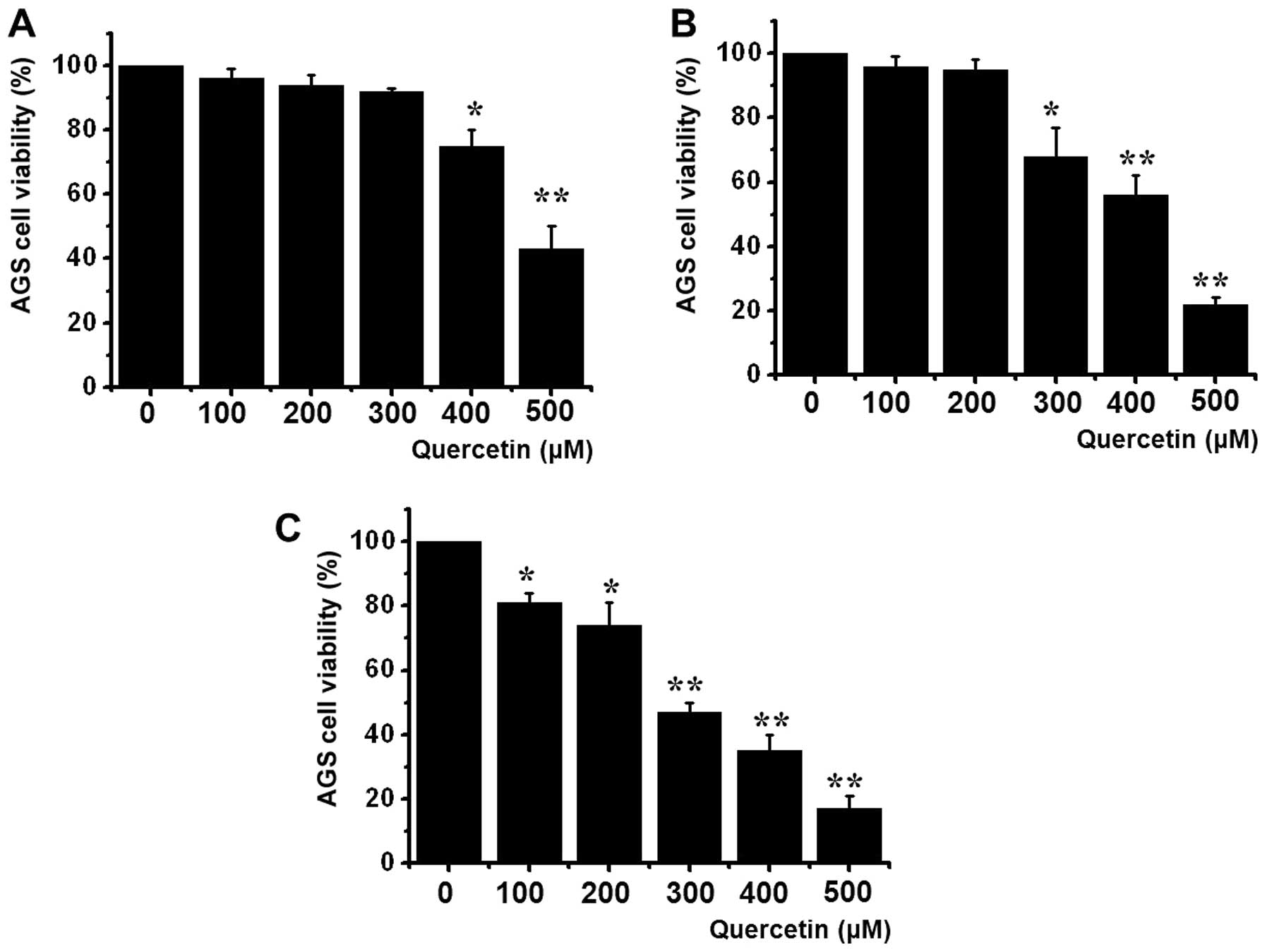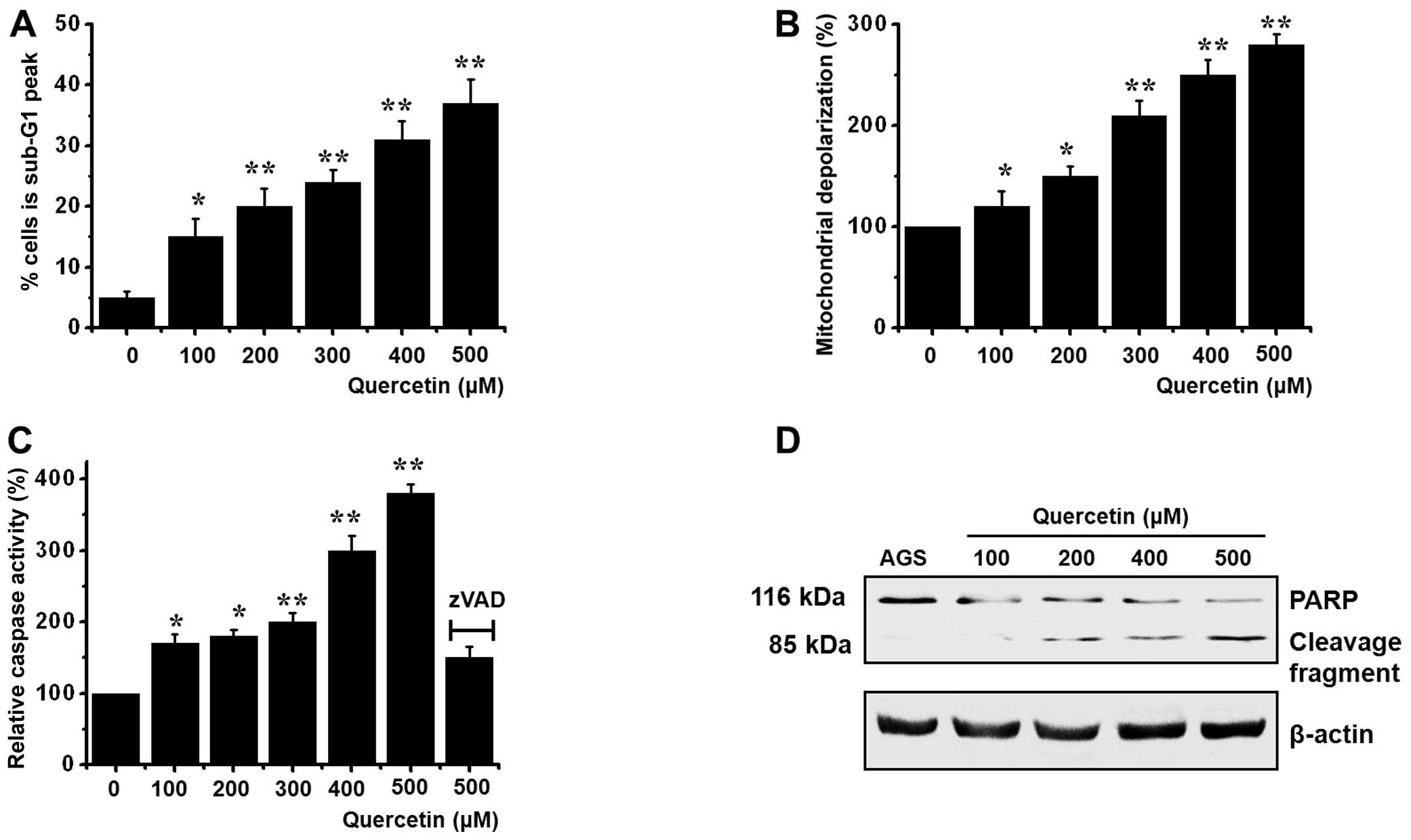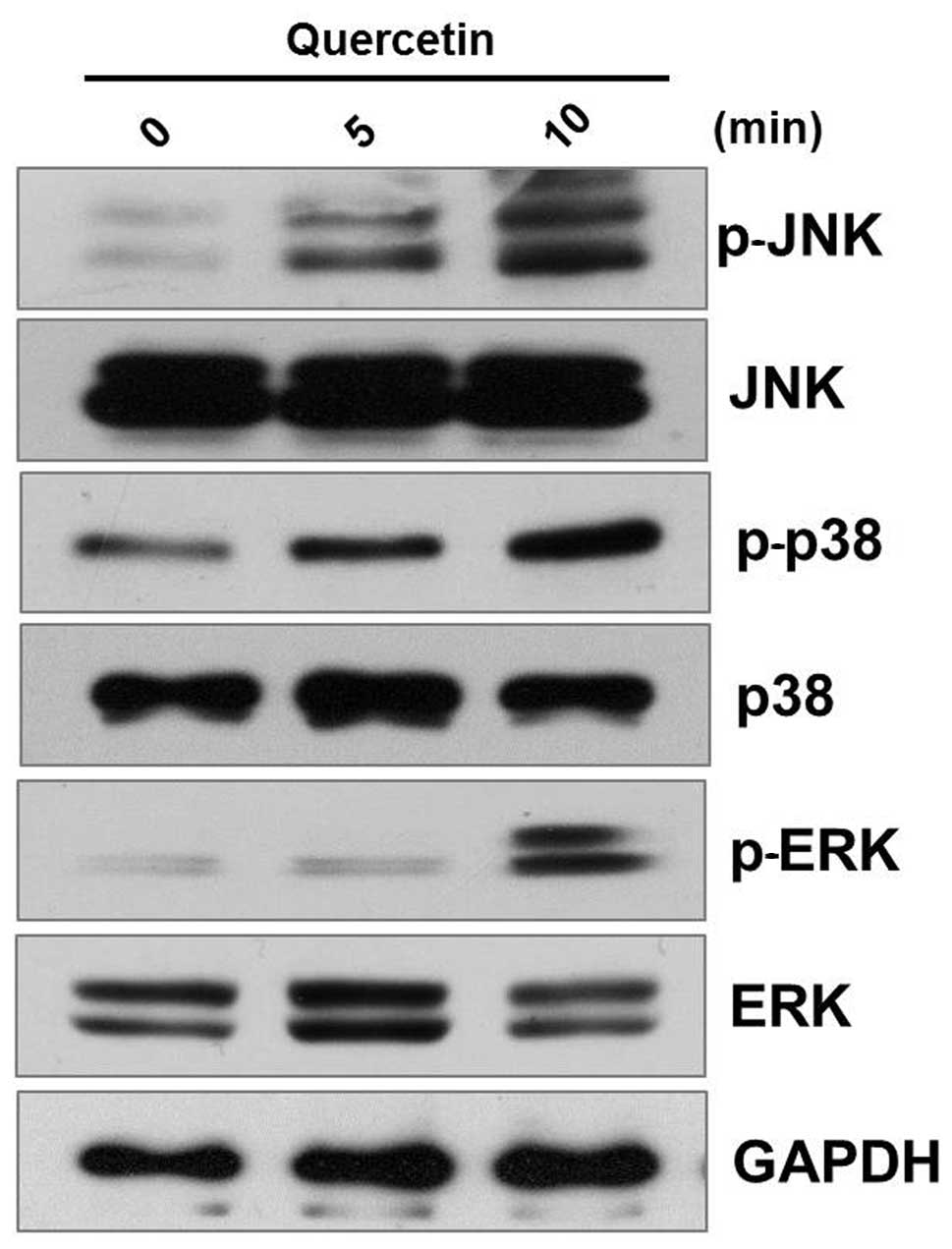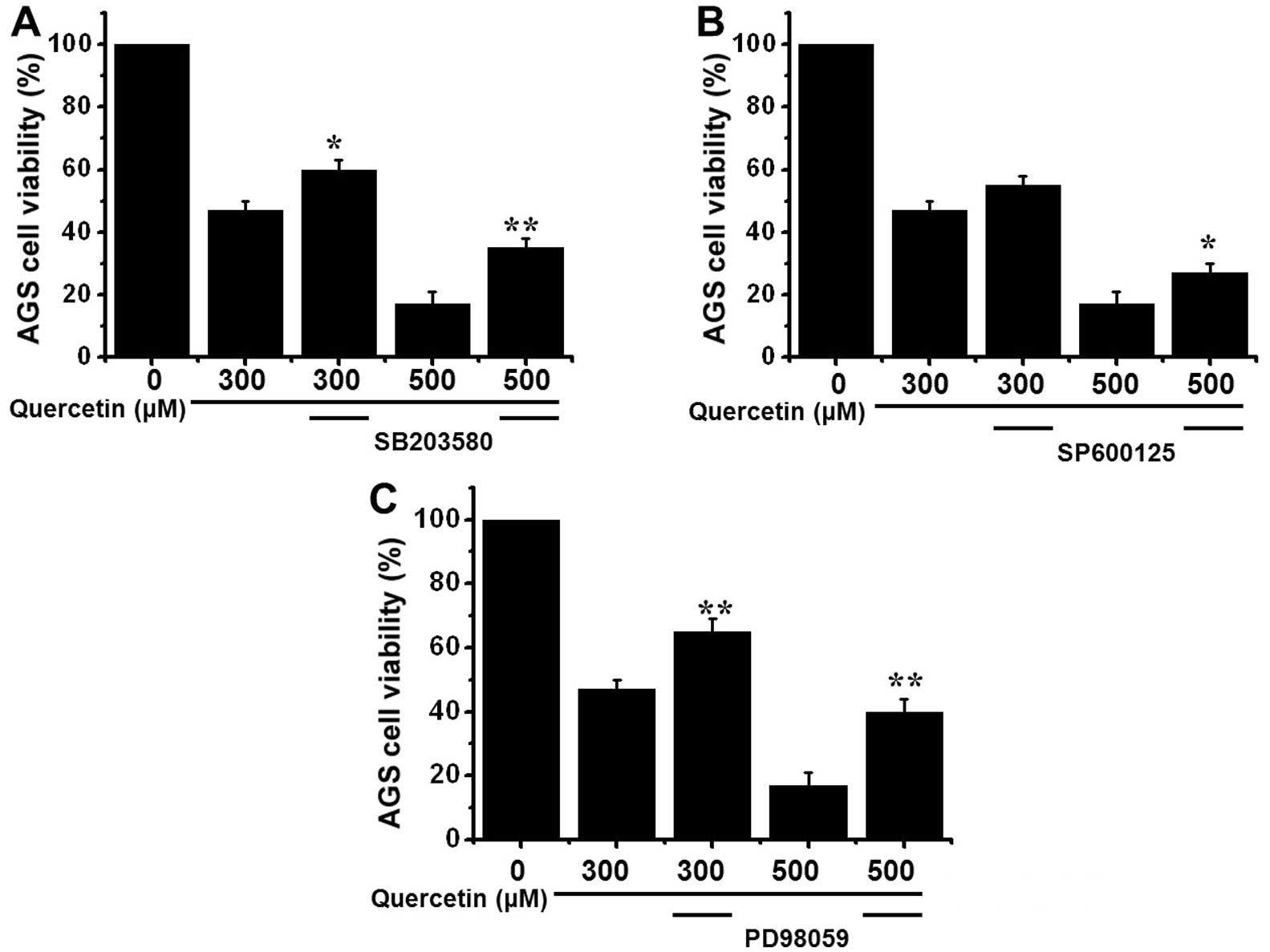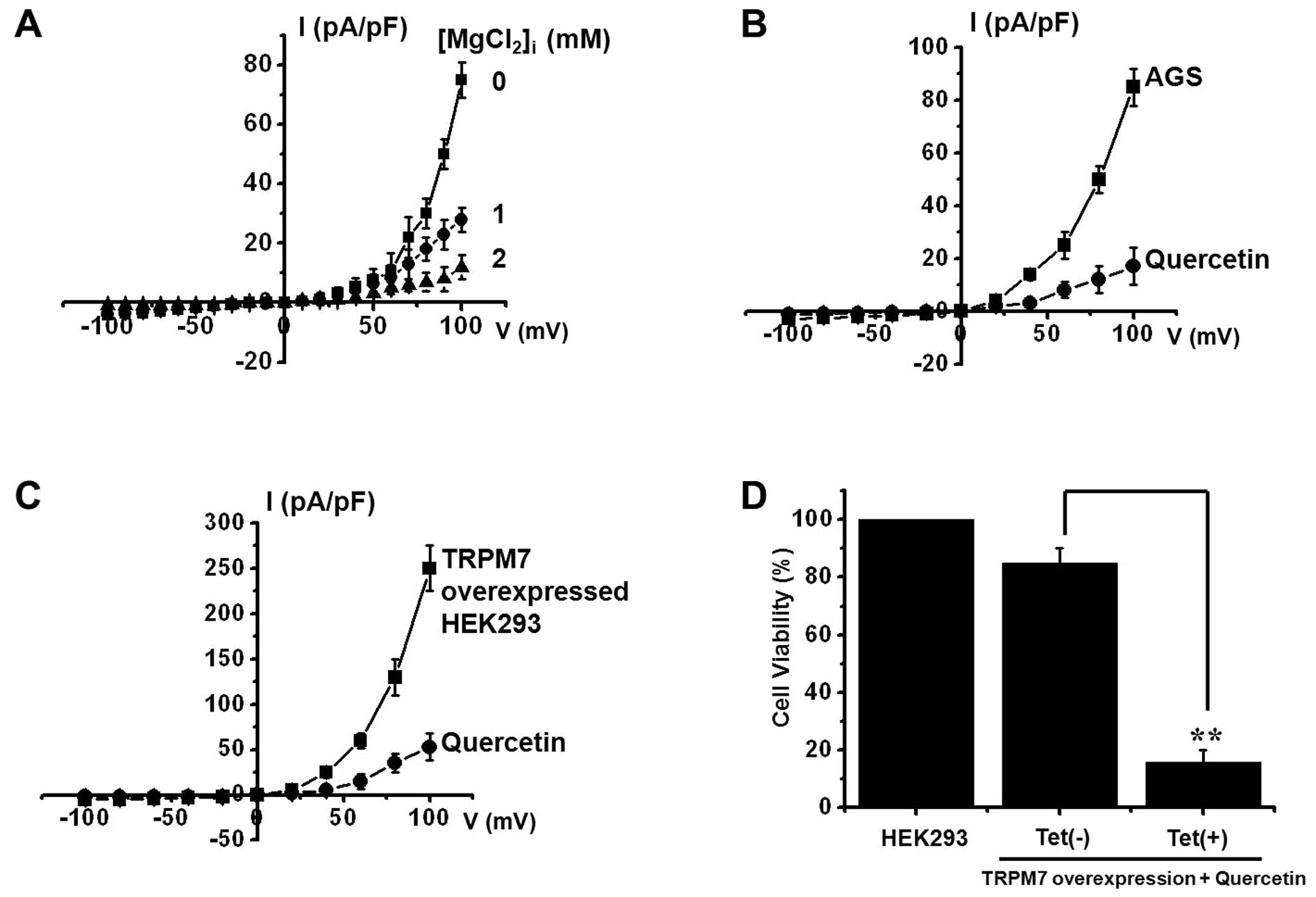|
1
|
Ferlay J, Shin HR, Bray F, Forman D,
Mathers C and Parkin DM: Estimates of worldwide burden of cancer in
2008: GLOBOCAN 2008. Int J Cancer. 127:2893–2917. 2010. View Article : Google Scholar : PubMed/NCBI
|
|
2
|
Bosman FT, Carneiro F, Hruban RH and
Theise ND: WHO Classification of Tumours of the Digestive System.
3. 4th edition. IARC Press; Geneva: 2010
|
|
3
|
Lowe SW and Lin AW: Apoptosis in cancer.
Carcinogenesis. 21:485–495. 2000. View Article : Google Scholar
|
|
4
|
Schmitt CA and Lowe SW: Apoptosis and
therapy. J Pathol. 187:127–137. 1999. View Article : Google Scholar
|
|
5
|
Ishizawa K, Yoshizumi M, Kawai Y, Terao J,
Kihira Y, Ikeda Y, Tomita S, Minakuchi K, Tsuchiya K and Tamaki T:
Pharmacology in health food: metabolism of quercetin in vivo and
its protective effect against arteriosclerosis. J Pharmacol Sci.
115:466–470. 2011. View Article : Google Scholar : PubMed/NCBI
|
|
6
|
Williams RJ, Spencer JPE and Rice-Evans C:
Flavonoids: antioxidants or signaling molecules? Free Rad Biol Med.
36:838–849. 2004. View Article : Google Scholar : PubMed/NCBI
|
|
7
|
Daskiewicz JB, Depeint F, Viornery L,
Bayet C, Comte-Sarrazin G, Comte G, Gee JM, Johnson IT, Ndjoko K,
Hostettmann K and Barron D: Effects of flavonoids on cell
proliferation and caspase activation in a human colonic cell line
HT29: an SAR study. J Med Chem. 48:2790–2804. 2005. View Article : Google Scholar : PubMed/NCBI
|
|
8
|
Surh YJ, Kundu JK, Na HK and Lee JS:
Redox-sensitive transcription factors as prime targets for
chemoprevention with anti-inflammatory and antioxidative
phytochemicals. J Nutr. 135:S2993–S3001. 2005.PubMed/NCBI
|
|
9
|
Kyle JA, Sharp L, Little J, Duthie GG and
McNeill G: Dietary flavonoid intake and colorectal cancer: a
case-control study. Br J Nutr. 103:429–436. 2010. View Article : Google Scholar : PubMed/NCBI
|
|
10
|
Stefani ED, Boffetta P, Deneo-Pellegrini
H, Mendilaharsu M, Carzoglio JC, Ronco A and Olivera L: Dietary
antioxidants and lung cancer risk: a case-control study in Uruguay.
Nutr Cancer. 34:100–110. 1999. View Article : Google Scholar : PubMed/NCBI
|
|
11
|
van Erk MJ, Roepman P, van der Lende TR,
Stierum RH, Aarts JM, van Bladeren PJ and van Ommen B: Integrated
assessment by multiple gene expression analysis of quercetin
bioactivity on anticancer-related mechanisms in colon cancer cells
in vitro. Eur J Nutr. 44:143–156. 2005.PubMed/NCBI
|
|
12
|
Dihal AA, de Boer VC, van der Woude H,
Tilburgs C, Bruijntjes JP, Alink GM, Rietjens IM, Woutersen RA and
Stierum RH: Quercetin, but not its glycosidated conjugate rutin,
inhibits azoxymethane-induced colorectal carcinogenesis in F344
rats. J Nutr. 136:2862–2867. 2006.PubMed/NCBI
|
|
13
|
Duo J, Ying GG, Wang GW and Zhang L:
Quercetin inhibits human breast cancer cell proliferation and
induces apoptosis via Bcl-2 and Bax regulation. Mol Med Rep.
5:1453–1456. 2012.PubMed/NCBI
|
|
14
|
Schönherr R: Clinical relevance of ion
channels for diagnosis and therapy of cancer. J Membr Biol.
205:175–184. 2005.PubMed/NCBI
|
|
15
|
Lehen’kyi V, Shapovalov G, Skryma R and
Prevarskaya N: Ion channels and transporters in cancer. 5 Ion
channels in control of cancer and cell apoptosis. Am J Physiol Cell
Physiol. 301:C1281–C1289. 2011.PubMed/NCBI
|
|
16
|
Wang BJ, Won SJ, Yu ZR and Su CL: Free
radical scavenging and apoptotic effects of Cordyceps
sinensis fractionated by supercritical carbon dioxide. Food
Chem Toxicol. 43:543–552. 2005. View Article : Google Scholar : PubMed/NCBI
|
|
17
|
Hotz MA, Gong J, Traganos F and
Darzynkiewicz Z: Flow cytometric detection of apoptosis: comparison
of the assays of in situ DNA degradation and chromatin changes.
Cytometry. 15:237–244. 1994. View Article : Google Scholar : PubMed/NCBI
|
|
18
|
Vermes I, Haanen C and Reutelingsperger C:
Flow cytometry of apoptotic cell death. J Immunol Methods.
243:167–190. 2000. View Article : Google Scholar : PubMed/NCBI
|
|
19
|
Kim BJ, Park EJ, Lee JH, Jeon JH, Kim SJ
and So I: Suppression of transient receptor potential melastatin 7
channel induces cell death in gastric cancer. Cancer Sci.
99:2502–2509. 2008. View Article : Google Scholar : PubMed/NCBI
|
|
20
|
Nadler MJ, Hermosura MC, Inabe K, Perraud
AL, Zhu Q, Stokes AJ, Kurosaki T, Kinet JP, Penner R, Scharenberg
AM and Fleig A: LTRPC7 is a Mg.ATP-regulated divalent cation
channel required for cell viability. Nature. 411:590–595. 2001.
View Article : Google Scholar : PubMed/NCBI
|
|
21
|
Jiang J, Li MH, Inoue K, Chu XP, Seeds J
and Xiong ZG: Transient receptor potential melastatin 7-like
current in human head and neck carcinoma cells: role in cell
proliferation. Cancer Res. 67:10929–10938. 2007. View Article : Google Scholar : PubMed/NCBI
|
|
22
|
Daker M, Ahmad M and Khoo AS:
Quercetin-induced inhibition and synergistic activity with
cisplatin - a chemotherapeutic strategy for nasopharyngeal
carcinoma cells. Cancer Cell Int. 12:342012. View Article : Google Scholar : PubMed/NCBI
|
|
23
|
Murakami A, Ashida H and Terao J:
Multitargeted cancer prevention by quercetin. Cancer Lett.
269:315–325. 2008. View Article : Google Scholar
|
|
24
|
Borska S, Chmielewska M, Wysocka T,
Drag-Zalesinska M, Zabel M and Dziegiel P: In vitro effect of
quercetin on human gastric carcinoma: targeting cancer cells death
and MDR. Food Chem Toxicol. 50:3375–3383. 2012. View Article : Google Scholar : PubMed/NCBI
|
|
25
|
Wang P, Zhang K, Zhang Q, Mei J, Chen CJ,
Feng ZZ and Yu DH: Effects of quercetin on the apoptosis of the
human gastric carcinoma cells. Toxicol In Vitro. 26:221–228. 2012.
View Article : Google Scholar : PubMed/NCBI
|
|
26
|
Wang K, Liu R, Li J, Mao J, Lei Y, Wu J,
Zeng J, Zhang T, Wu H, Chen L, Huang C and Wei Y: Quercetin induces
protective autophagy in gastric cancer cells: involvement of
Akt-mTOR- and hypoxia-induced factor 1α-mediated signaling.
Autophagy. 7:966–978. 2011.PubMed/NCBI
|
|
27
|
Das S, Dey KK, Bharti R, MaitiChoudhury S,
Maiti S and Mandal M: PKI 166 induced redox signalling and
apoptosis through activation of p53, MAP kinase and caspase pathway
in epidermoid carcinoma. J Exp Ther Oncol. 10:139–153. 2012.
|
|
28
|
Yuan L, Wang J, Xiao H, Wu W, Wang Y and
Liu X: MAPK signaling pathways regulate mitochondrial-mediated
apoptosis induced by isoorientin in human hepatoblastoma cancer
cells. Food Chem Toxicol. 53:62–68. 2013. View Article : Google Scholar : PubMed/NCBI
|
|
29
|
Pearson G, Robinson F, Beers Gibson T, Xu
BE, Karandikar M, Berman K and Cobb MH: Mitogen-activated protein
(MAP) kinase pathways: regulation and physiological functions.
Endocr Rev. 22:153–183. 2001.PubMed/NCBI
|
|
30
|
Clapham DE: TRP channels as cellular
sensors. Nature. 426:517–524. 2003. View Article : Google Scholar : PubMed/NCBI
|
|
31
|
Pedersen SF, Owsianik G and Nilius B: TRP
channels: an overview. Cell Calcium. 38:233–252. 2005. View Article : Google Scholar : PubMed/NCBI
|
|
32
|
Runnels LW, Yue L and Clapham DE:
TRP-PLIK, a bifunctional protein with kinase and ion channel
activities. Science. 291:1043–1047. 2001. View Article : Google Scholar : PubMed/NCBI
|
|
33
|
Hanano T, Hara Y, Shi J, Morita H,
Umebayashi C, Mori E, Sumimoto H, Ito Y, Mori Y and Inoue R:
Involvement of TRPM7 in cell growth as a spontaneously activated
Ca2+ entry pathway in human retinoblastoma cells. J
Pharmacol Sci. 95:403–419. 2004. View Article : Google Scholar : PubMed/NCBI
|
|
34
|
Dhennin-Duthille I, Gautier M, Faouzi M,
Guilbert A, Brevet M, Vaudry D, Ahidouch A, Sevestre H and
Ouadid-Ahidouch H: High expression of transient receptor potential
channels in human breast cancer epithelial cells and tissues:
correlation with pathological parameters. Cell Physiol Biochem.
28:813–822. 2011. View Article : Google Scholar
|
|
35
|
Guilbert A, Gautier M, Dhennin-Duthille I,
Haren N, Sevestre H and Ouadid-Ahidouch H: Evidence that TRPM7 is
required for breast cancer cell proliferation. Am J Physiol Cell
Physiol. 297:C493–C502. 2009. View Article : Google Scholar : PubMed/NCBI
|
|
36
|
Schmitz C, Perraud AL, Johnson CO, Inabe
K, Smith MK, Penner R, Kurosaki T, Fleig A and Scharenberg AM:
Regulation of vertebrate cellular Mg2+ homeostasis by
TRPM7. Cell. 114:191–200. 2003. View Article : Google Scholar : PubMed/NCBI
|
|
37
|
Aarts M, Iihara K, Wei WL, Xiong ZG,
Arundine M, Cerwinski W, MacDonald JF and Tymianski M: A key role
for TRPM7 channels in anoxic neuronal death. Cell. 115:863–877.
2003. View Article : Google Scholar : PubMed/NCBI
|
|
38
|
Elizondo MR, Arduini BL, Paulsen J,
MacDonald EL, Sabel JL, Henion PD, Cornell RA and Parichy DM:
Defective skeletogenesis with kidney stone formation in dwarf
zebrafish mutant for trpm7. Curr Biol. 15:667–671. 2005. View Article : Google Scholar : PubMed/NCBI
|
|
39
|
Vriens J, Owsianik G, Voets T, Droogmans G
and Nilius B: Invertebrate TRP proteins as functional models for
mammalian channels. Pflugers Arch. 449:213–226. 2004.PubMed/NCBI
|
|
40
|
Brauchi S, Krapivinsky G, Krapivinsky L
and Clapham DE: TRPM7 facilitates cholinergic vesicle fusion with
the plasma membrane. Proc Natl Acad Sci USA. 105:8304–8308. 2008.
View Article : Google Scholar : PubMed/NCBI
|
|
41
|
Sahni J and Scharenberg AM: TRPM7 ion
channels are required for sustained phosphoinositide 3-kinase
signaling in lymphocytes. Cell Metab. 8:84–93. 2008. View Article : Google Scholar : PubMed/NCBI
|
|
42
|
Abed E and Moreau R: Importance of
melastatin-like transient receptor potential 7 and cations
(magnesium, calcium) in human osteoblast-like cell proliferation.
Cell Prolif. 40:849–865. 2007. View Article : Google Scholar : PubMed/NCBI
|
|
43
|
Patel T, Gores GJ and Kaufmann SH: The
role of proteases during apoptosis. FASEB J. 10:587–597. 1996.
|
|
44
|
Lin C, Holland RE Jr, Donofrio JC, McCoy
MH, Tudor LR and Chambers TM: Caspase activation in equine
influenza virus induced apoptotic cell death. Vet Microbiol.
84:357–365. 2002. View Article : Google Scholar : PubMed/NCBI
|















